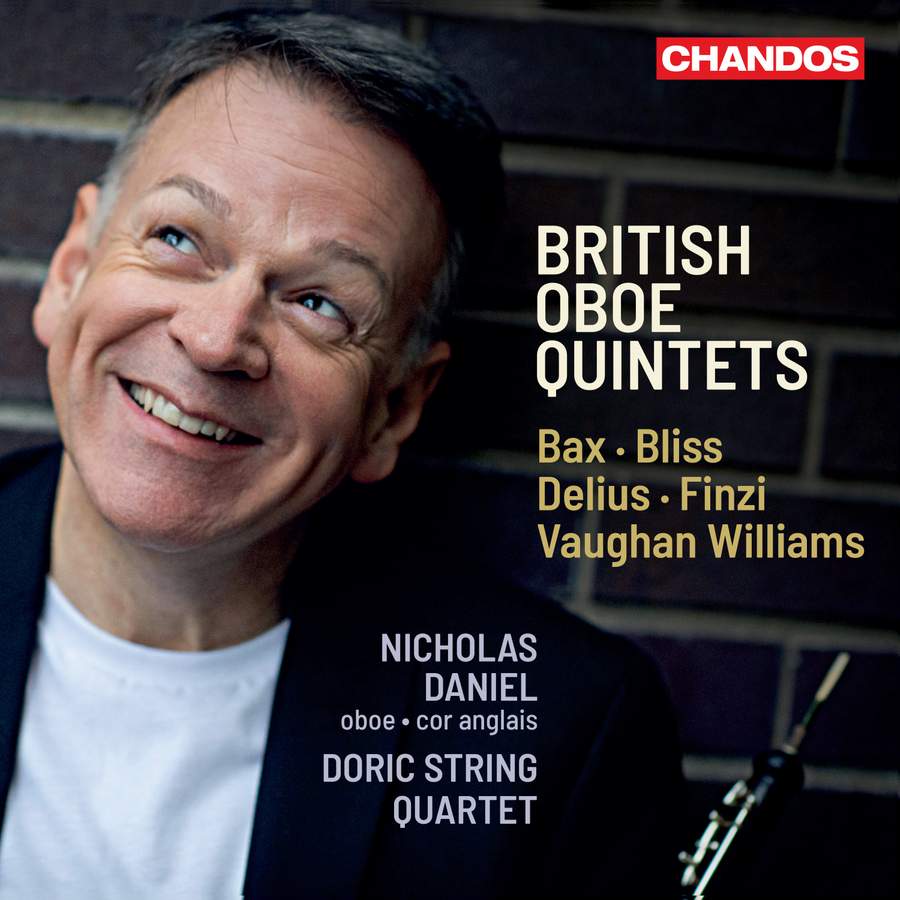Review: British Oboe Quintets (Gramophone)

The chamber combination of oboe and string quartet would seem to lend itself ideally to the pastoral image of British music of the first half of the 20th century, yet the works featured on this recording provide a much more colourful perspective of this somewhat stereotypical image we have often been ready to accept in the past. We have, as Mervyn Cooke’s helpful notes inform us, to thank the agency of Léon Goossens, who did so much to promote the solo qualities of the oboe, for the range of composers and for the varied repertoire he encouraged. Through his influence alone, so much modern British oboe music was composed and performed by him, and four works featured here – by Bax, Bliss, Finzi and Delius – have his stamp on their dedication, composition or arrangement.
Fenby’s arrangements of the two interludes from Delius’s last opera, Fennimore and Gerda (1908 10), made in 1977, were ideally suited to the oboe quintet in that the original score so prominently highlights the oboe and much of the rich accompanying texture of the divided strings translates well to the quartet. As more buoyant music, from what is otherwise a dark and brooding opera, these two pieces form satisfying miniatures, and to hear them played by Nicholas Daniel on Goossens’s original Lorée instrument gives us a unique insight into the older player’s expressive world. Bax’s Oboe Quintet (1922), dedicated to Goossens, is a much denser work, reflecting the composer’s new symphonic mindset (the First Symphony dates from the same year). For me the high point of the characteristic three-movement design is the ravishing slow movement, in which Daniel and the Doric Quartet show off the ever-changing timbres of Bax’s vibrant scoring (the sul ponticello moments are particularly captivating), while the much shorter ‘gigue’ finale has an admirable vivacity.
To hear the oft-arranged Six Studies in English Folk Song by Vaughan Williams on the cor anglais offers not only an appropriate ‘relief’ from the solo oboe (as well as an indication of Daniel’s dexterity) but also a pleasing divergence of timbre, in that the folk tunes are lent an affecting melancholy hue by the distinctive scoring. This contrasts markedly with Bliss’s Oboe Quintet, which Goossens premiered in Venice in September 1927. For all its post-Romantic richness, the work still retains that wiry neoclassical edge that epitomised so many of the composer’s immediate post war works, redolent of his French contemporaries and Stravinsky. A superb work, notably the lively finale, performed here with real bravura, it was evidently a work the composer enjoyed working on, inspired by Goossens’s virtuoso reputation.
Finzi’s Interlude (1932 36), an interesting one-movement work in several linked sections, constitutes the longest single structure on this recording. A bittersweet essay, full of the composer’s individual nuances of lyrical yet plangent tenderness, it is one of Finzi’s regrettably few excursions into chamber music, in which his natural inclination for counterpoint is given utterance – an aspect commendably embodied in the beautiful clarity of this interpretation and the recorded sound.
Jeremy Dibble, Gramophone Magazine, September 2021
Read this review online at gramophone.co.uk
